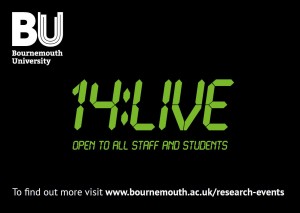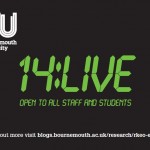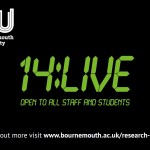
Have you ever considered what’s in your food when you’re eating out?
14:Live will be welcoming FoodSMART on 28 February, at 14:00-15:00.
FoodSMART is an innovative technical ICT solution which uses QR coding on your smartphone to provide nutritional information and deliver personalised advice when eating out. This means that consumers can make an informed choice about what they’re eating. The app can even be tailored to your individual dietary requirements or tastes.
It can be quite difficult to eat healthily when in a restaurant or cafe, as menus often give you limited information about the ingredients in a meal. By working with partners across Europe- nutritionists, chefs and other universities- the team have developed an app that can show exactly what is in your meal. The app gives consumers all the data they need and encourages the food service industry to support healthier eating.
Come along to Floor 5, of the Student Centre, on Talbot Campus to hear from Dr Heather Hartwell as she speaks all about the project and even get a chance to test out the prototype.
If you have any questions, then please contact Hannah Jones
 The effect of large scale interventions on improving public health
The effect of large scale interventions on improving public health 14:Live Presents- Festival Fear of Missing Out (FoMO): What is it and how can you manage it?
14:Live Presents- Festival Fear of Missing Out (FoMO): What is it and how can you manage it? BU establishes Food & Drink Research Group
BU establishes Food & Drink Research Group 14:Live Presents- Festival Fear of Missing Out (FoMO): What is it and how can you manage it?
14:Live Presents- Festival Fear of Missing Out (FoMO): What is it and how can you manage it?










 From Sustainable Research to Sustainable Research Lives: Reflections from the SPROUT Network Event
From Sustainable Research to Sustainable Research Lives: Reflections from the SPROUT Network Event REF Code of Practice consultation is open!
REF Code of Practice consultation is open! BU Leads AI-Driven Work Package in EU Horizon SUSHEAS Project
BU Leads AI-Driven Work Package in EU Horizon SUSHEAS Project ECR Funding Open Call: Research Culture & Community Grant – Apply now
ECR Funding Open Call: Research Culture & Community Grant – Apply now ECR Funding Open Call: Research Culture & Community Grant – Application Deadline Friday 12 December
ECR Funding Open Call: Research Culture & Community Grant – Application Deadline Friday 12 December MSCA Postdoctoral Fellowships 2025 Call
MSCA Postdoctoral Fellowships 2025 Call ERC Advanced Grant 2025 Webinar
ERC Advanced Grant 2025 Webinar Update on UKRO services
Update on UKRO services European research project exploring use of ‘virtual twins’ to better manage metabolic associated fatty liver disease
European research project exploring use of ‘virtual twins’ to better manage metabolic associated fatty liver disease